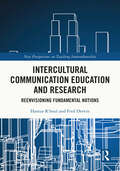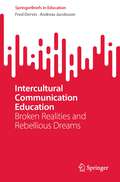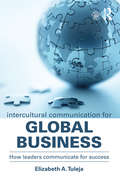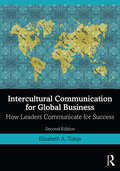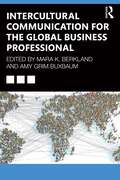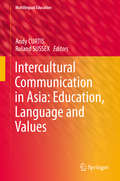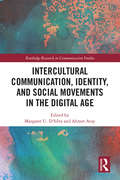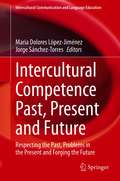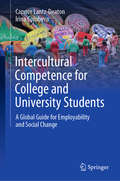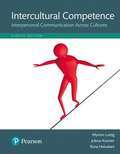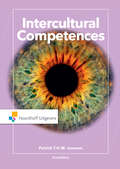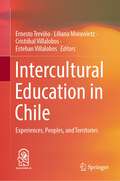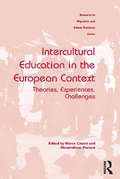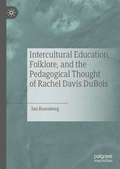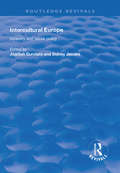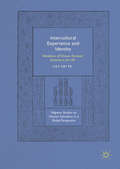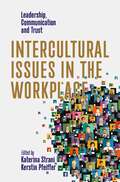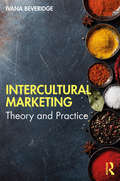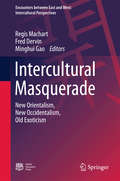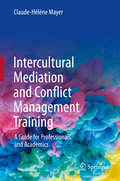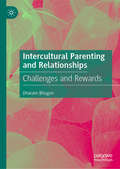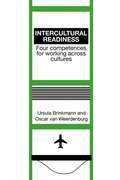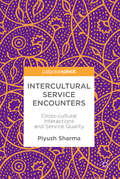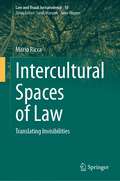- Table View
- List View
Intercultural Communication Education and Research: Reenvisioning Fundamental Notions (New Perspectives on Teaching Interculturality)
by Fred Dervin Hamza R'boulSeeking to uncover underlying epistemic invisibilities in generating intercultural communication education and research knowledge and to open up space for envisaging interculturality alternatively, this book reexamines and problematizes the assumptions and ontologies in the conceptual systems of interculturality. In enunciating and critiquing what has been largely endorsed, normalized and taken for granted, this volume brings to the fore different, changing and situated understandings of intercultural ontologies and epistemologies in terms of premises, workings and objectives, unveiling the entangled factors and contexts that have delimited and circumscribed the realm. The authors believe that the field would benefit from some cognitive and sensory dissonance while reengaging effectively with notions to move forward. In particular, they endeavour to de-monumentalize and disrupt the very conceptual tenets that may have rendered interculturality myopic, repetitive, monolithic and aseptic in expanding the epistemic concerns of the “intercultural”, especially in the English language. This book will be an essential read for scholars and students of the sociology of education, educational philosophy and intercultural education and also for all readers interested in the broad field of interculturality.
Intercultural Communication Education: Broken Realities and Rebellious Dreams (SpringerBriefs in Education)
by Fred Dervin Andreas JacobssonThis book explores the notion of interculturality in education and supports scholars in their discovery of the notion. Continuing the author’s previous work, the book urges (communication) education researchers and educators to 'interculturalize' interculturality. This book corresponds to the authors’ endeavor to complexify the way interculturality is discussed, expressed, (co-)constructed and advocated in different parts of the world and in different languages. To interculturalize interculturality is to expand the way we deal with the notion as an object of scientific and educational discourse, noting the dominating voices and allowing for silenced voices that are rarely heard around interculturality to emerge. This book is based on broken realities and (the authors’) rebellious dreams. As two researchers and educators with a long experience examining discourses of interculturality, this book represents the authors’ program for the future of intercultural communication education. The book is divided into three 'tableaus' (living descriptions) depicting today’s 'broken' realities of interculturality and two 'rebellious' dreams of what it could be in research and education.
Intercultural Communication for Global Business: How Leaders Communicate for Success
by Elizabeth A. TulejaThis book brings together principles and new theories in intercultural communication in a concise and practical manner, focusing on communication as the foundation for management and global leadership. Grounded in the Cultural Intelligence Model, this compact text examines the concepts associated with understanding culture and communication in the global business environment to help readers: • Understand intercultural communication processes. • Improve self-awareness and communication in intercultural settings. • Expand skills in identifying, analyzing, and solving intercultural communication challenges at work. • Evaluate whether one’s communication has been effective. Richly illustrated with examples, activities, real-world applications, and recent case studies that make the content come alive, Intercultural Communication for Global Business is an ideal companion for any business student or manager dedicated to communicating more effectively in a globalized society.
Intercultural Communication for Global Business: How Leaders Communicate for Success
by Elizabeth A. TulejaAs concise and practical as ever, this new edition brings together principles and new theories in intercultural communication, focusing on communication as the foundation for management and global leadership. Grounded in the need for building awareness and knowledge, practicing mindfulness, and then working on skill development, this text examines the concepts associated with understanding culture and communication in the global business environment to help readers: understand intercultural communication processes; improve self-awareness and communication in intercultural settings; expand skills in identifying, analyzing, and solving intercultural communication challenges at work; and evaluate whether one’s communication has been effective. This fully updated new edition also includes completely updated case studies, with an increased emphasis on non-US perspectives, to show real-world applications across the globe. Richly illustrated with new examples and activities, this text is the ideal companion for any business student or manager dedicated to communicating more effectively in a globalized society.
Intercultural Communication for the Global Business Professional
by Mara K. Berkland Amy Grim BuxbaumThis text integrates business and communication concepts to immerse students in the global communication experiences of business professionals. The authors argue that the essentials of intercultural communication, such as nonverbal communication, conflict, meeting management, interviewing, and negotiations are most useful to burgeoning professionals when they are woven into discussions about economic systems, market forces, production processes, finance structures, and human resources priorities. Each chapter begins with an explanation of theories and key terms appropriate for introductory-level students in both business and communication, then supplements that discussion with examples that demonstrate the concepts at work. The cases chosen represent different market systems in both dominant and emerging economies, explaining the cultures of competitive markets with a global perspective rather than focusing on the United States. This book is ideal as a text for courses in international business or professional intercultural communication, or as a supplement for more general business and communication courses.
Intercultural Communication in Asia: Education, Language and Values (Multilingual Education #24)
by Roland Sussex Andy CurtisThis volume presents in-depth studies on leading themes in education policy and intercultural communication in contemporary Asia, covering empirical as well as theoretical approaches, and offering both an in-depth investigation of their implications, and a synthesis of areas where these topics cohere and point to advances in description, analysis and theory, policy and applications. The studies address key questions that are essential to the future of education in an Asia where intercultural communication is ever more important with the rise of the ASEAN Economic Community and other international initiatives. These questions include the properties of the increasing globalisation of communication and how it plays out in Asia, especially but not exclusively with reference to English, and how we can place intercultural communication in this context, as well as studies that highlight intercultural communication and its underlying value systems and ideologies in Asia.
Intercultural Communication, Identity, and Social Movements in the Digital Age (Routledge Research in Communication Studies)
by Ahmet Atay Margaret U. D’SilvaThis book examines the complex and multidimensional relationship between culture and social media, and its specific impact on issues of identity and social movements, in a globalized world. Contemporary cyber culture involves communication among people who are culturally, nationally, and linguistically similar or radically different. Social media becomes a space for mediated cultural information transfer which can either facilitate a vibrant public sphere or create cultural and social cleavages. Contributors of the book come from diverse cultural backgrounds to provide a comprehensive analysis of how these social media exchanges allow members of traditionally oppressed groups find their voices, cultivate communities, and construct their cultural identities in multiple ways. This book will be of great relevance to scholars and students working in the field of media and new media studies, intercultural communication, especially critical intercultural communication, and academics studying social identity and social movements.
Intercultural Communication, Identity, and Social Movements in the Digital Age (Routledge Research in Communication Studies)
by Margaret U. D’Silva; Ahmet AtayThis book examines the complex and multidimensional relationship between culture and social media, and its specific impact on issues of identity and social movements, in a globalized world. Contemporary cyber culture involves communication among people who are culturally, nationally, and linguistically similar or radically different. Social media becomes a space for mediated cultural information transfer which can either facilitate a vibrant public sphere or create cultural and social cleavages. Contributors of the book come from diverse cultural backgrounds to provide a comprehensive analysis of how these social media exchanges allow members of traditionally oppressed groups find their voices, cultivate communities, and construct their cultural identities in multiple ways.This book will be of great relevance to scholars and students working in the field of media and new media studies, intercultural communication, especially critical intercultural communication, and academics studying social identity and social movements.
Intercultural Competence Past, Present and Future: Respecting the Past, Problems in the Present and Forging the Future (Intercultural Communication and Language Education)
by María Dolores López-Jiménez Jorge Sánchez-TorresThis book explores the benefits of teaching reflection upon one’s own culture to develop intercultural competence and looks into the relationship between the proficiency level of the second language and the target culture. It introduces new debates on the concept of ‘critical cultural awareness’ in intercultural learning and teaching, for example the indiscriminate use of terminologies related to the idea of ‘intercultural encounters’. Also, it provides insight into the relationship between language and culture using a new tool such as the Autobiography of Intercultural Encounters through Visual Media. The presentation of different approaches, tools, barriers, educational and cultural realities, online intercultural exchange projects and concepts such as motivation, attitudes, stereotyping, otherization, and critical cultural awareness makes this book an excellent instrument not only for teachers but also for researchers, policy-makers and private and public institutions that want to explore culture and interculturality and to promote an intercultural competence and global citizenship among its learners / users / clients and / or an interculturally-oriented language education.
Intercultural Competence for College and University Students: A Global Guide for Employability and Social Change
by Irina Golubeva Caprice Lantz-DeatonThis practical guide is a must read for students interested in developing the attitudes, knowledge, skills, and values that foster positive relationships with people from diverse cultures both within and outside of the workplace. It contains real-life examples from students drawn from the authors’ work across different countries. In an age of growing diversity and increasing global mobility, living and working with people from different cultural backgrounds is becoming the norm. To address this complex topic, the authors invite students to consider key questions such as: How do our cultural backgrounds influence our behavior towards others? What is intercultural competence and how can it help students to get along in work and life? How can institutions help students to develop intercultural competence? What does it have to do with topics like prejudice, discrimination, and racism? How can intercultural competence facilitate social change and help students to succeed in their careers?Written for students in any country and studying in any discipline, this book includes practical activities designed to help students to develop intercultural competence throughout their time at college or university. It is useful for students as an autonomous learning source, or as a resource for taught courses.Drawing on a comprehensive and rigorous knowledge of the field, the authors have written a thought-provoking analysis and a practical guide to understanding and enacting Intercultural Competence. I learnt from and admire their ambitious vision of the significance of intercultural competence for society and for the lives and careers of their readers.— Michael Byram, author of Teaching and Assessing Intercultural Communicative Competence, Durham University, UK This is a wonderfully readable book, which carefully and clearly explains the concept of intercultural competence, exploring its implications for addressing many of the most crucial issues facing the world today. Based on impeccable scholarship, and containing a wealth of practical activities, this book is highly recommended for students and interested laypeople alike.— Martyn Barrett, University of Surrey, UKAn exceptionally user-friendly and theory-informed guidebook that would not only benefit university students but anyone with an interest in intercultural communication. The book is second to none in terms of clarity of presentation and coverage of concepts, models and practical ideas relevant to intercultural competence for the contemporary society. —Anwei Feng, University of Nottingham Ningbo, ChinaAn essential handbook and excellent addition to conventional textbooks. Nuanced and down-to-earth explanations about intercultural communication which are accessible to everyone. Insightful explanations for educators and students alike. Easy to use self-study guide with thought-provoking exercises. This book has been long needed and has come at just the right time. --Ivett Guntersdorfer, Founder and Director of the Intercultural Communication Certificate Program, Ludwig-Maximilians-Universität München, Germany
Intercultural Competence: Interpersonal Communication Across Cultures
by Myron W. Lustig Jolene KoesterStriking a unique balance between skills and theory, Intercultural Competence provides readers with the background and confidence to succeed in today's multicultural environment. Blending both the practical and theoretical, the concrete and abstract, this book is both enjoyable to read and thoroughly researched. By clearly explaining different theories and the significance of cultural patterns and having readers practice what they learn via examples in the book, Intercultural Competence better prepares readers to interact in intercultural relationships. The book also provides a discussion of important ethical and social issues relating to intercultural communication. The authors cover U.S. cultures as well as global cultural issues.
Intercultural Competences: A Legal And Empirical Analysis (Routledge-Noordhoff International Editions)
by Patrick T.H.M. JanssenIn a multicultural environment, having intercultural competences is the most important determining factor between success and failure. This concise book introduces the topic for students and scholars. Building upon an accessible understanding of cultural differences, the author provides various models for understanding and framing culture. Theory is linked to practice by examining how to deal with intercultural conflicts via practical examples and advice. Students striving to perform well in intercultural environments, will benefit from reading this book which helps them convert models and cultural knowledge into practical skills.
Intercultural Education in Chile: Experiences, Peoples, and Territories
by Ernesto Treviño Liliana Morawietz Cristóbal Villalobos Esteban VillalobosThis book examines the status of intercultural education in Chile. It does this through three axes: the first is multidisciplinary, including historical, anthropological, sociological, and pedagogical, to account for varied aspects of the Chilean intercultural education. The second is the consideration of multiple indigenous peoples, analyzing students’ groups or indigenous peoples, such as the Rapa Nui, Aymara, or Mapuche. Finally, the book has a multilevel perspective that recognizes that educational policy involves different actors, from the central government to local communities.The book incorporates study material enriched with the experience and analysis of different perspectives and methodologies of its authors, being useful for understanding intercultural education in the country. It is a versatile resource for understanding this topic, as well as a support for the development of programs and policies.Translation from the Spanish language edition: Educación Intercultural en Chile. Experiencias, pueblos y territorios by Ernesto Treviño, et al., © Ediciones UC 2017. Published by Ediciones UC. All Rights Reserved.
Intercultural Education in the European Context: Theories, Experiences, Challenges (Research in Migration and Ethnic Relations Series)
by Marco Catarci Massimiliano FiorucciThis book offers a comparative analysis of the intercultural theories and practices developed in the European context. Bringing together work on the United Kingdom, France, Germany, Italy, Spain, Greece, The Netherlands and Sweden, it examines specific approaches to intercultural education. Structured around a series of core questions concerning the main features of diverse groups of migrants present within a country and within schools, the major issues raised by scientific research on the presence of migrant students, and the adoption of relevant educational policies and practices to address these issues - together with examples of best practice in each case - Intercultural Education in the European Context explores the strengths and weaknesses of the intercultural education approach adopted in each context. Offering a broad framework for the study of intercultural education as adopted in European settings, the book highlights the contribution of education to the development of a fair, democratic and pluralistic Europe. As such, it will appeal to scholars and policy makers in the field of sociology, migration, education and intercultural relations.
Intercultural Education, Folklore, and the Pedagogical Thought of Rachel Davis DuBois
by Jan RosenbergThis book provides a history of the Quaker educator and intercultural education pioneer Rachel Davis DuBois (1892-1993) that explores the period in which DuBois lived and the key works she created. The opening section establishes the disciplinary contexts of her work, education, and folklore, and the subsequent sections present DuBois' pedagogical methods as they were developed and exemplified by her programs. Throughout the narrative, Rosenberg includes reflections on her own experience as a practitioner of the intercultural and folklife education DuBois championed.
Intercultural Europe: Diversity and Social Policy
by Jagdish Gundara Sydney JacobsThis title was first published in 2000: The essays in this text examine interculturalism in Europe, focusing on social diversity and social policy within the European Union. Issues addressed include racism and social policy, migrant communities in Europe, ethnic diversity, intercultural education and housing and segregation.
Intercultural Experience and Identity: Narratives of Chinese Doctoral Students in the UK (Palgrave Studies on Chinese Education in a Global Perspective)
by Lily Lei YeThis book examines the identity formation and negotiation of Chinese doctoral students in the UK, and the opportunity for self-transformation this experience offers. As the largest group of international students in the English-speaking world, Mainland Chinese students encounter a range of difficulties and prospects that may be relevant to the wider international student community. Using extensive qualitative and empirical data, the author explores the narratives of eleven Chinese doctoral students at two British universities through a sociological perspective. Balancing analysis with solid theoretical framework and the voices of the students themselves, the author moves away from essentialism and ‘othering’, instead shining a light on the effects of globalisation, internationalisation and recent policy strategies. This volume will be of interest and value to students and scholars of comparative and international education, identity formation, intercultural communication, the sociology of education and study abroad.
Intercultural Issues in the Workplace: Leadership, Communication and Trust
by Katerina Strani Kerstin PfeifferThis textbook addresses key issues and challenges in contemporary multicultural and multilingual workplaces through the lens of leadership, communication and trust. It draws together contributions from fields including cultural studies, psychology, sociolinguistics, translation and interpreting studies, and business management, making a valuable contribution to the area of language and culture in the workplace. The volume is divided into 5 thematic sections: Intercultural Communication; Cross-cultural Leadership; Economy; Language; and Diversity. It offers a critical analysis on themes that tend to be overlooked in intercultural business and management scholarship, such as multilingualism in the workplace, translation and interpreting in cross-cultural work practices, dignity in the workplace, performing gender in the workplace, and D/deaf people in the workplace. It also revisits themes such as cross-cultural leadership, interculturality and the embedded economy, and managing uncertainty in the context of the contemporary globalized workplace. It then brings everything together in a Cross-Cultural Scenarios chapter at the end, with recommendations for every scenario. Overall, the textbook constitutes an essential resource for honours undergraduate and postgraduate students in these and related fields, as well as academics and practitioners with an interest in globalised workplaces.
Intercultural Marketing: Theory and Practice
by Ivana BeveridgeWith companies actively marketing products and services beyond their borders, marketers must understand culturally ingrained consumer behavior throughout the world. Focusing on psychological and social dimensions of these behaviors, this textbook brings together academic research and contemporary case studies from marketing practice.Built on a strong, cross-disciplinary theoretical foundation and extensive practice experience, this concisely written text is a practical guide to understanding the intricacies of cultural influence on consumption, and for the design and implementation of effective intercultural marketing strategies, focused on branding and promotion. The book uses representative, well-known corporate cases while also including dynamic examples from the sharing economy, blockchain, and emerging economy companies. Incorporating strategy, sociology, linguistics, cross-cultural communications, psychology, philosophy, religious studies, and economics, the book is particularly distinguished from the mainstream by introducing non-Western frameworks.Upper-level undergraduate and postgraduate students of marketing and international business will benefit from the book’s new concepts and novel methods, as well as clear objectives, examples, and discussion topics in each chapter. Instructors will appreciate the inclusion of a semester-long project for students, allowing them to wear the "practitioner’s hat" and including practice in a netnographic research method.
Intercultural Masquerade
by Fred Dervin Regis Machart Minghui GaoThis volume revisits the notions of Orientalism, Occidentalism and, to a certain extent, Reverse Orientalism/Occidentalism in the 21st century, adopting post-modern, constructionist and potentially non-essentialising approaches. The representations of the 'cultural Other' in education, literature and the arts are examined by scholars working in Australia, France, Hong Kong, Japan, Malaysia, Singapore and the USA. Vinyl compilations, TV series, novels, institutional discourses and surveys, amongst others, are examined so as to better understand how people construct their identity in relation to an imagined and idealised Other. This book will appeal to all researchers and students interested in cultural identity and stereotypes of the 'East' and the 'West', in particular in the fields of academic mobility, cultural studies, intercultural education, postcolonial literature and media studies.
Intercultural Mediation and Conflict Management Training: A Guide for Professionals and Academics
by Claude-Hélène MayerThis book introduces the topic of intercultural mediation and conflict management. Based on the latest scientific research and successful conflict management practices, it provides theoretical insights and practical, self-reflective exercises, role-plays and case studies on conflict, mediation, intercultural mediation, and solution-finding in conflict mediation. The book serves both as a self-learning tool to expand personal competences and cultural sensitivity, and as training material for seminars, workshops, secondary, advanced and higher education and vocational training. It is a valuable contribution to the fields of intercultural conflict mediation and conflict management, intercultural communication, intercultural training and coaching.This is a book about practicing – the applied practice of competent conflict crafts in diverse intercultural contexts. Conflict practitioners, mediators, and intercultural trainers would be inspired by Professor Claude-Hélène Mayer’s creative integration of relevant intercultural models with do-able conflict strategies and in reaching intergroup harmony with reflexivity and cultural resonance.--- Professor Stella Ting-Toomey, Human Communication Studies, California State University at Fullerton, USA, and Co-Editor of The SAGE Handbook of Conflict Communication, 2eGiven the difficulty and complexity of successful intercultural collaboration and conflict mediation, this is a much-needed addition to cross-cultural positive psychology. It is rich in content and training. I highly recommend it for teaching, corporate training, and for executive coaches.--- Professor Paul T.P. Wong, President International Network on Personal Meaning and President Meaning-Centered Counselling Institute, Toronto, CanadaIntercultural conflict resolution is a critically important task in this modern world. This book by Professor Mayer is a welcome handbook on how to use mediation to resolve those conflicts. It should be in the library of every conflict mediator. My congratulations to Professor Mayer for her important work.--- Dan Landis, Founding President, International Academy of Intercultural Research, Affiliate Professor of Psychology, University of Hawaii
Intercultural Parenting and Relationships: Challenges and Rewards
by Dharam BhugunThis book provides understandings of how intercultural, -racial, -ethnic, -national, and -faith couples and parents in Australia bring up their children and manage their relationships. Which challenges and benefits do they encounter, and which strategies do they use to negotiate their differences and belongingness? In portraying the lived experiences of intercultural couples and parents, Bhugun considers contextual and external factors such as individual and personality traits, the environment, gender and power, religion, socio-economic status, extended family, friends, and diasporic communities. Moving the reader from beyond negative stereotypes to a more nuanced representation of both the challenges and benefits of the phenomenon, Intercultural Parenting and Relationships provides intimate testimonies and offers innovations in theory and practice.Scholars, practitioners, students, intercultural couples, parents, families and the wider community will benefit from the rich insights into the challenges and successes of intercultural relationships and parenting presented in this book.
Intercultural Readiness
by Ursula Brinkmann Oscar Van WeerdenburgDrawing on research from 30,000 individuals and their practical experience as intercultural management consultants, the authors provide insights into the broader landscape of intercultural management through their exploration of 4 competencies: Intercultural Sensitivity, Intercultural Communication, Building Commitment and Managing Uncertainty.
Intercultural Service Encounters: Cross-cultural Interactions and Service Quality
by Piyush SharmaThis book investigates intercultural service encounters (ICSEs) in light of the rapidly globalizing world economy, examining the extant literature on the topic and identifying areas which require further exploration. With a focus on intercultural communication and competence, the author analyses diverse conceptual frameworks, providing theoretical models and practical initiatives for those working within the services marketing industry. An excellent resource for anyone interested in how culture shapes customer and employee expectations and perceptions, this book addresses the potential implications and limitations of future models.
Intercultural Spaces of Law: Translating Invisibilities (Law and Visual Jurisprudence #10)
by Mario RiccaThis book proposes an interdisciplinary methodology for developing an intercultural use of law so as to include cultural differences and their protection within legal discourse; this is based on an analysis of the sensory grammar tacitly included in categorizations. This is achieved by combining the theoretical insights provided by legal theory, anthropology and semiotics with a reading of human rights as translational interfaces among the different cultural spaces in which people live. To support this use of human rights’ semantic and normative potential, a specific cultural-geographic view dubbed ‘legal chorology’ is employed. Its primary purpose is to show the extant continuity between categories and spaces of experience, and more specifically between legal meanings and the spatial dimensions of people’s lives. Through the lens of legal chorology and the intercultural, translational use of human rights, the book provides a methodology that shows how to make space and law reciprocally transformative so as to create an inclusive legal grammar that is equidistant from social cultural differences. The analysis includes: a critical view on opportunities for intercultural secularization; the possibility of construing a legal grammar of quotidian life that leads to an inclusive equidistance from differences rather than an unachievable neutrality or an all-encompassing universal legal ontology; an interdisciplinary methodology for legal intercultural translation; a chorological reading of the relationships between human rights protection and lived spaces; and an intercultural and geo-semiotic examination of a series of legal cases and current issues such as indigenous peoples’ rights and the international protection of sacred places.
